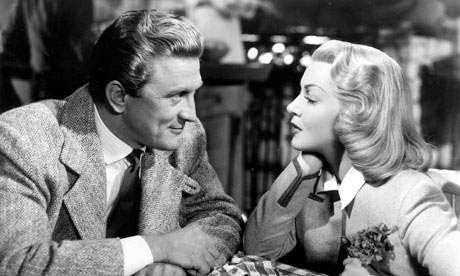← Back to Reviews
in
#257 - The Bad and the Beautiful
Vincente Minnelli, 1952

A movie executive summons three different Hollywood players - one a director, one an actress, one a writer - to talk about their relationships to a certain big-shot Hollywood producer.
A film about a wildly successful tycoon told from the point of view of several people who knew the horrible truth about what he was really like? Like that'd ever become a classic. But seriously, folks, The Bad and the Beautiful may not have the most original premise, but that hardly matters as it decides to satirise Hollywood (but not too much, of course) through the tale of a big-shot movie producer (Kirk Douglas) who follows in his late father's footsteps and goes from Poverty Row journeyman to big-name executive. The framing device is because of his former superior (Walter Pidgeon) calling together three of Douglas' erstwhile collaborators - a director (Barry Sullivan) who worked with Douglas from their lowly beginnings, an actress (Lana Turner) who Douglas picked to star in his movies, and a writer (Dick Powell) who moves to Hollywood to write for the movies. As such, the film is broken into telling each of their stories and how they all focus on Douglas.
The film juggles its anthology-like narrative reasonably well, with Sullivan's story properly establishing Douglas' determination and greed borne of resentment while also giving the audience an insight into his riches-to-rags-to-more-riches journey. Turner's story is naturally more rooted in romantic drama and probably makes for the most interesting of the three stories as the interplay between her and Douglas seriously develops the relatively basic character that was observed in Sullivan's segment. That does undermine Powell's segment of the film somewhat as it comes across as a little less striking that Turner's, though his story of an uninterested novelist being chewed up by the Hollywood machine purely because his ditzy wife (Gloria Grahame) wants to experience the glamour first-hand is especially tragic (and gets more so by the time it finishes).
The Bad and the Beautiful carries out its fairly complex narrative with technical aplomb and the performers are generally decent - Douglas is good as always, though I do wonder how Grahame won an Oscar considering her lack of screen-time (she is good, but when there's Oscars involved, it's hard not to apply extra scrutiny). It's understandably got a considerable amount of cynicism, but the extent of the cynicism seems to be aimed at the kind of bastards that truly manage to succeed in Hollywood more so than at Hollywood in general. This film states that it is possible for good people to succeed, but the costs are still too great to be truly worth it.
Vincente Minnelli, 1952

A movie executive summons three different Hollywood players - one a director, one an actress, one a writer - to talk about their relationships to a certain big-shot Hollywood producer.
A film about a wildly successful tycoon told from the point of view of several people who knew the horrible truth about what he was really like? Like that'd ever become a classic. But seriously, folks, The Bad and the Beautiful may not have the most original premise, but that hardly matters as it decides to satirise Hollywood (but not too much, of course) through the tale of a big-shot movie producer (Kirk Douglas) who follows in his late father's footsteps and goes from Poverty Row journeyman to big-name executive. The framing device is because of his former superior (Walter Pidgeon) calling together three of Douglas' erstwhile collaborators - a director (Barry Sullivan) who worked with Douglas from their lowly beginnings, an actress (Lana Turner) who Douglas picked to star in his movies, and a writer (Dick Powell) who moves to Hollywood to write for the movies. As such, the film is broken into telling each of their stories and how they all focus on Douglas.
The film juggles its anthology-like narrative reasonably well, with Sullivan's story properly establishing Douglas' determination and greed borne of resentment while also giving the audience an insight into his riches-to-rags-to-more-riches journey. Turner's story is naturally more rooted in romantic drama and probably makes for the most interesting of the three stories as the interplay between her and Douglas seriously develops the relatively basic character that was observed in Sullivan's segment. That does undermine Powell's segment of the film somewhat as it comes across as a little less striking that Turner's, though his story of an uninterested novelist being chewed up by the Hollywood machine purely because his ditzy wife (Gloria Grahame) wants to experience the glamour first-hand is especially tragic (and gets more so by the time it finishes).
The Bad and the Beautiful carries out its fairly complex narrative with technical aplomb and the performers are generally decent - Douglas is good as always, though I do wonder how Grahame won an Oscar considering her lack of screen-time (she is good, but when there's Oscars involved, it's hard not to apply extra scrutiny). It's understandably got a considerable amount of cynicism, but the extent of the cynicism seems to be aimed at the kind of bastards that truly manage to succeed in Hollywood more so than at Hollywood in general. This film states that it is possible for good people to succeed, but the costs are still too great to be truly worth it.
